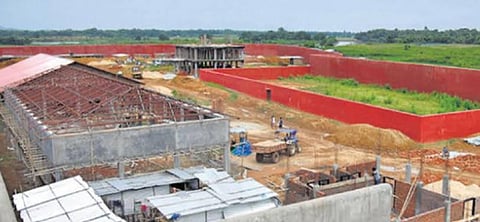
Guwahati- Citizenship and illegal migration have always been a hot topic in the northeastern state of Assam. These issues not only have an impact on the political climate of the state but plays a role in polarizing people too. Whatever the impact is, such systems at the end drag structurally oppressed communities. Even the checks are flawed, due to which innocent lives are affected. Recently, the Guwahati High Court acknowledged a statement from the Assam government, stating that nearly 85% of the cases brought to the foreigner’s tribunals ended with the individuals being recognized as Indians.
In an order issued on November 21, and disclosed on December 1, a panel of judges directed the Assam government to re-evaluate instances where the foreigner’s tribunals declared individuals as citizens or foreigners without thoroughly examining the supporting documents.
The Mooknayak spoke with Anjuman Ara Begum, who is a Human Rights researcher and an Associate Professor at Department of Law at Royal Global University of Guwahati, Assam. She talked about the tribunals and the communities who are impacted by them.
Opening about the dilemma that people who are deemed to be “foreigners” go through, the researcher said, “normally, laws follow the principle of ‘innocent until proven guilty’ but in case of citizenship, you are ‘presumed to be a foreigner until you are proven Indian.’ I have documented more than 40 cases but the interesting aspect of all the cases is that not the entire families are thought to be foreigners. Also, most people who are declared to be foreigners do not have the financial privilege to pursue long litigations. Access to justice is quite limited.”
Anjuman then went on to talk about the obvious victims of any system: the marginalised communities. She said, “some of them are selling their land and whatever resources they have because cases in Foreigners Tribunal takes at least 3-4 years. Foreigners Tribunal also does not have an option to appeal. Appeals can also be made at Guwahati High Court. Approaching the High Court again becomes an issue of economic difficulty. They are not able to apply for legal aid too as their ‘citizenship’ is being questioned.”
“There are multiple cases which have really opened by eyes regarding the affect of such cases on communities,” she continued. “There was a family where the husband fought for citizenship rights for years but then the wife from the same family is declared a foreigner. In another case, a person has been declared ‘illegal’ in three tribunals! A case happened in Bongaigaon district where one person from the family was in a detention camp, but the family could not afford any litigation cost. When they came to know that they had lost the case in the High Court and had to approach the Supreme Court, the wife of the victim committed suicide.”
Anjuman revealed, “people who are declared ‘foreigners’ are mostly from the Bengali Muslim community from western Assam. After that, the next major group is Bengali Hindus. Many tribal people also get entangled in the web of citizenship such as from Garo and Hajong groups.”
“There is a provision for courts to provide legal aid and lawyers to people who are unable to pay for cases against them. That is not the case in Foreigners Tribunal as they are a quasi-judicial body. Tribunals are meant for small cases to provide instant justice. But citizenship right is one of the most important rights which is directly related to your other fundamental rights. The issue of genuine Indians being harassed in the name of foreigners have been put up a number of times. People have been put in detention camps for many years which is not justified. If someone is an illegal immigrant, you should deport and not detain them.”
Anjuman went on to add, “just because Assam has an issue with illegal immigration, that does not mean you have to make some particular communities suffer. The process through which ‘foreigners’ are detected and determined is done is not a fair process. Now the dominant narrative is that Bangladeshis are occupying Assam. Even the kind of statements given by our politicians are polarizing. Himanta Biswa Sharma, the chief minister of Assam, has on multiple occasions said that they do not require the vote of Muslim community. Such statements are bound to affect the psyche of the state.”
Talking about the few things that should be done to reduce the chances of common people getting affected, the researcher stated, “the tribunal should be supervised by the High Court. Also, citizenship is a central subject. The state should not be making decisions around it.
Foreigners' tribunals are semi-judicial entities in Assam responsible for determining the citizenship status of individuals whose names are absent from the National Register of Citizens (NRC) for the state or are suspected of being illegal immigrants.
The controversial NRC procedure, completed in 2018, aimed to compile a list of individuals who could provide evidence of their presence in the state before March 24, 1971, the day preceding the commencement of the Bangladesh Liberation War. This process resulted in the exclusion of 1.9 million residents from the list.
According to Government of Assam’s website, there are currently 100 Foreigners Tribunals operating in Assam. Originally, there were 11 Illegal Migrant Determination Tribunals (IMDT) in place. However, after the repeal of the IMDT Act, the Assam government established 21 new Foreigners Tribunals in 2005.
In 2009, an additional 4 Foreigners Tribunals were set up, and in 2014, 64 more were established to address pending cases in the Tribunals.
Members of the Foreigners Tribunals, who are either judges or advocates, are appointed in accordance with the Foreigners Tribunal Act of 1941 and the Foreigners Tribunal Order of 1964. These appointments follow government guidelines issued periodically.
Also Read-
You can also join our WhatsApp group to get premium and selected news of The Mooknayak on WhatsApp. Click here to join the WhatsApp group.